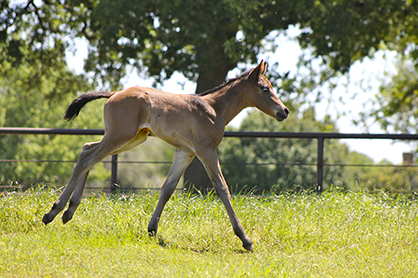Care of the Mare and Foal During Weaning Time
Uckele Health & Nutrition
With feral horses, by the time weaning occurs naturally both mare and foal are more than ready for it. When we hasten the process artificially, there is inevitable stress.
Foals depend on their dams for basic survival needs of nutrition and protection from predators or even other horses. The dam also gives the foal its social status in the band. Mares fulfill these functions because of the extremely powerful drive of their instincts and hormones.
Interfering with this bond predictably causes anxiety, even anguish. This means poor appetite, vocalizing, pacing (or running if room allows), poor concentration and diminished awareness of people, other animals, even physical barriers. In the worst-case scenario, they may be a danger both to themselves and others.
A variety of methods are used, from gradual lengthening of periods apart to abrupt complete separation. When separation is final, mare and foal should not be able to see or hear each other. Foals do best either housed in individual stalls or pastured in a group of familiar peers with at least one quiet and tolerant adult baby sitter.
Mares are more likely than foals to end up being stall confined or put in with a group of unfamiliar horses after weaning. Their stress levels can therefore be higher, and some individuals may benefit from supplementation geared to help balance these reactions such as Valerian root, thiamine, magnesium and taurine.
Behavioral manifestations of stress in foals are best handled by management of their environment, keeping them with familiar companions, a stabilizing adult, and confined in an area with sturdy and safe fencing. However, there are still often problems with the babies going off feed. Maintaining adequate nutrition that is without excessive calories is also an issue for mares that need to decrease milk production, but often are pregnant.
The solution to this problem begins before weaning. Both the mares and foals have extremely high requirements for protein and minerals compared to adults that are not growing, lactating or pregnant. They require a diet denser in protein and minerals per calorie.
The easiest way to achieve this is to provide needed calories with a well-balanced adult type concentrate and forage, then to supplement with a high protein and mineral supplement that can be adjusted to the needs of the stage of growth, pregnancy or lactation.
Look for 25% protein from milk and high-quality vegetable sources with guaranteed lysine and methionine levels. There should be a balanced, high potency mineral profile with 5 to 6% calcium and 500 ppm copper. Unlike supplements for adults, a moderate level of iron inclusion is advisable for this age group. Fat soluble and full spectrum B vitamins complete the support package. Because this nutrition is in a concentrated form they are more likely to eat it all.
Weaning is no fun. Reduce physical dangers by careful management of the environment and nutritional calming support as needed. Deal with dietary shortfalls caused by poor appetite with the use of a concentrated protein and mineral supplement that is more likely to be completely consumed.
Uckele Health & Nutrition, maker of CocoSoya®, offers formulas for the Mare and Weanling.
RLX-ALL takes the edge off without making the horse too dull. Promotes a sense of relaxation and mental alertness without drowsiness in a palatable powder or paste. With Valerian to promote a calming effect on the brain and Thiamine (B1) to promote healthy nervous system and muscle function. Taurine provides calming and mental focus support for proper nerve transmission and muscle function to promote and calm and relaxed disposition.
Seroquine is a palatable herb-free calming supplement to support healthy nervous system function while maintaining alertness. May reduce hyperactivity and promote relaxation for normal emotional balance. With Magnesium to support a healthy stress response and nervous system function. Also contains the B-vitamins Thiamine and Inositol, and Taurine, which helps modulate the stress hormones cortisol and adrenaline. Available in a powder or paste.
Milk & Grow helps meet the increased protein, vitamin and mineral demands of the pregnant and lactating mare and growing foal. Highly digestible protein supplement with favorable profiles for all the essential amino acids including the most often deficient amino acid, L-Lysine. Combined with a complete spectrum of vitamins, minerals, and Probiotics in an easy to feed, dust-free pellet.
About Dr. Kellon
Dr. Eleanor Kellon, staff veterinary specialist for Uckele Health & Nutrition, is an established authority in the field of equine nutrition for over 30 years, and a founding member and leader of the Equine Cushings and Insulin Resistance (ECIR) group, whose mission is to improve the welfare of horses with metabolic disorders via integration of research and real-life clinical experience. Prevention of laminitis is the ultimate goal. www.ecirhorse.org
Uckele Health & Nutrition, maker of CocoSoya, is an innovation-driven health company committed to making people and their animals healthier. On the leading edge of nutritional science and technology for over 50 years, Uckele formulates and manufactures a full spectrum of quality nutritional supplements incorporating the latest nutritional advances. www.uckele.com.











